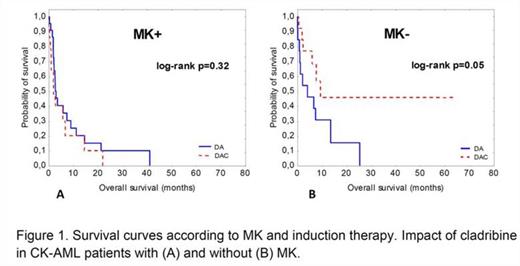Abstract
Objectives:Cytogenetics is one of the most important prognostic factors in acute myeloid leukemia (AML). Two major, partially overlapping cytogenetic subsets of AML associated with an adverse prognosis, are AML with complex karyotype (CK) and AML with monosomal karyotype (MK). MK has been shown to constitute a cytogenetic feature that identifies AML patients (pts) with very poor outcomes when treated with currently available therapy. CK-AML pts are very heterogeneous cytogenetically, and treatment outcomes of these subsets are also influenced by TP53 alterations, complexity of the karyotype or presence of residual normal metaphases. However, impact of all these variables on outcome of CK-AML patients was so far analyzed separately.
The aim of our study was to assess treatment outcome of CK-AML patients with or without MK regarding some cytogenetic and clinical features.
Materials and methods: One hundred twenty five newly diagnosed AML patients with CK treated between January 2007 and January 2013 with PALG protocols (Holowiecki et al., JCO 2012) were included into the study. Cytogenetic analysis was performed on metaphases from bone marrow aspirates taken at diagnosis using standard banding techniques. Karyotypes were reported in accordance with the ISCN 2009. CK was defined as a presence of ≥ 3 unrelated abnormalities. MK was defined by the presence of an autosomal monosomy in conjunction with at least one other autosomal monosomy or structural abnormality in the absence of t(8;21), inv(16), t(15;17) (Breems et al., JCO 2008). FISH method was used to verify MK in all cases with monosomy as well as to assess 17p13 (TP53) deletion.
Results:Clinical characteristics. The median age of all pts was 60 years (range 19-85 years). FISH verification proved the MK karyotype (MK+) in 75 out of 125 (60%) pts with CK-AML. Remaining pts had non-monosomal CK (MK-). Sixty six (55%) pts received intensive induction chemotherapy (IC) according to PALG protocols and 59 pts received non-intensive treatment with low-dose cytarabine (LDAC) or best supportive care (BSC). Baseline characteristics were generally balanced between MK+ and MK- groups in terms of age, WBC and PLT counts, hemoglobin level, percentage of bone marrow blasts at diagnosis and presence of residual normal metaphases in the karyotype. Higher proportions of MK+ pts had deletion of 17p13 (TP53) (47,9% vs. 20,4% of MK-; p=0.0017) as well as ≥5 cytogenetic aberrations (93,3% vs. 74%; p=0.004). Furthermore, there were no differences in the proportion of IC, LDAC and BSC strategies between both groups.
Treatment Response and Outcome. With the median time of follow-up 7,7 months (mos), median OS in MK- pts was significantly longer compared to MK+ group (4,5 mos vs. 2,0 mos; p=0.0075). 66/125 CK-AML pts received standard IC according to PALG AML protocols (DA-36 pts; DAC-27 pts and DAF-3 pts). Only 7 pts underwent allogeneic stem cell transplantation (allo-SCT). In intensively treated pts the overall CR rate in MK- was about twice as high as in MK+ group (62,1% vs 32,4%; p=0.013). The median OS in MK- pts was longer compared to MK+ group (6,8 mos vs. 2,7 mos; p=0.016). Probability of 1-year OS in MK+ vs. MK- group was 14% vs. 30%. In multivariate analysis we have found that WBC >20 G/l, MK and ≥5 chromosomal abnormalities were independent prognostic factors associated with significantly shorter OS (Table 1). In contrast, allo-SCT was associated with survival benefit. Furthermore, we analyzed the impact of purine analogue containing induction regimens on treatment outcome. We found that addition of cladribine to the standard DA regimen improves OS in MK- but not in MK+ group (Figure 1).
Conclusions: Monosomal karyotype, high WBC count and high complexity of the karyotype (≥5 aberrations) are associated with more aggressive clinical course and short survival in high-risk CK-AML. Cladribine added to standard DA induction regimen prolongs survival of pts with complex but not monosomal karyotype.
*AW and EW equally contributed to the study.
No relevant conflicts of interest to declare.
Author notes
Asterisk with author names denotes non-ASH members.



